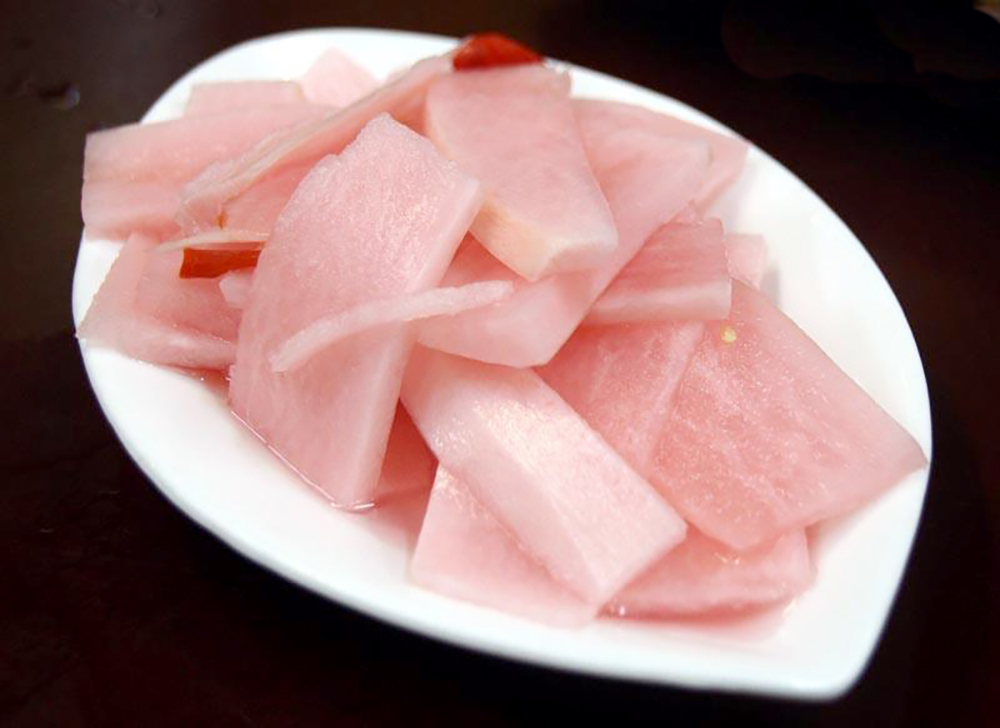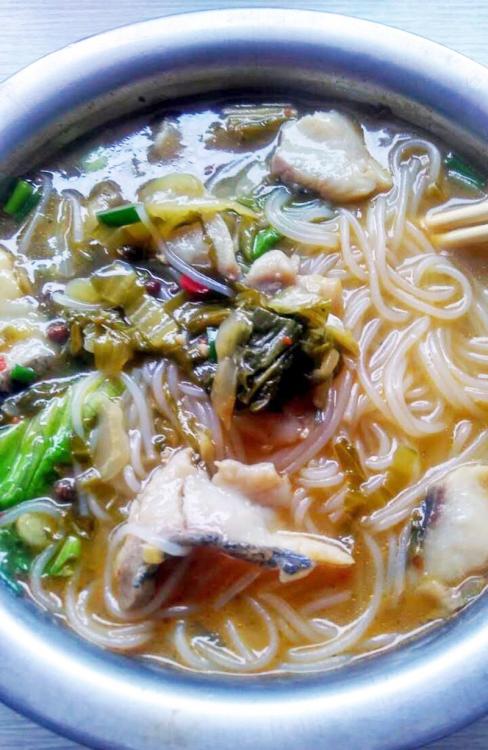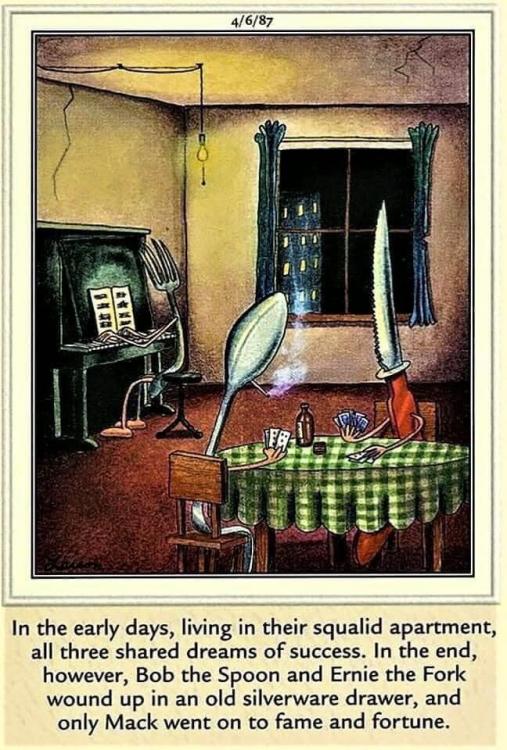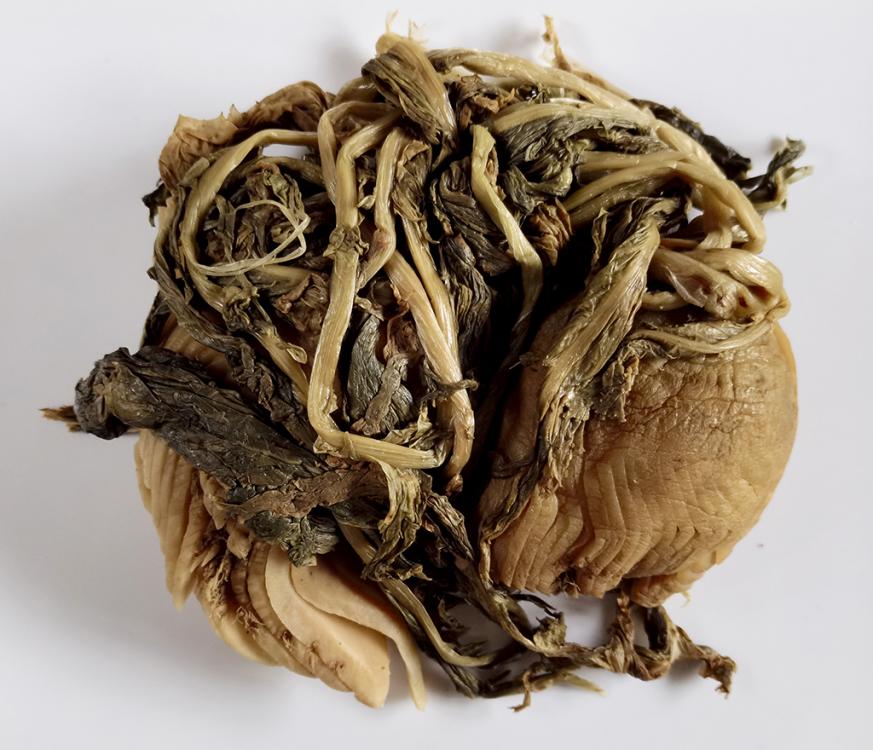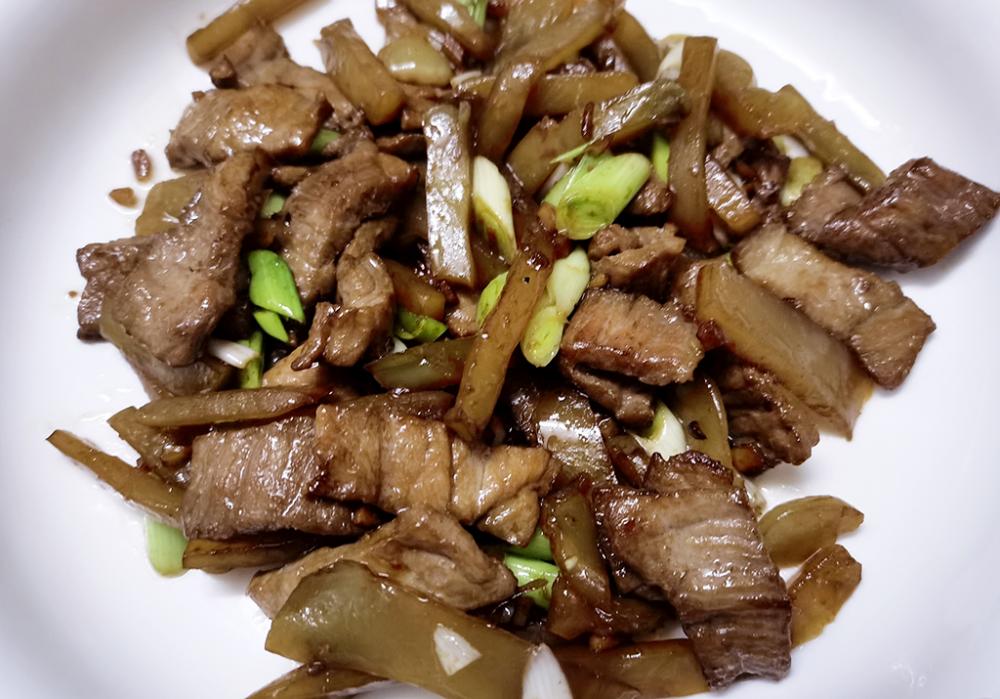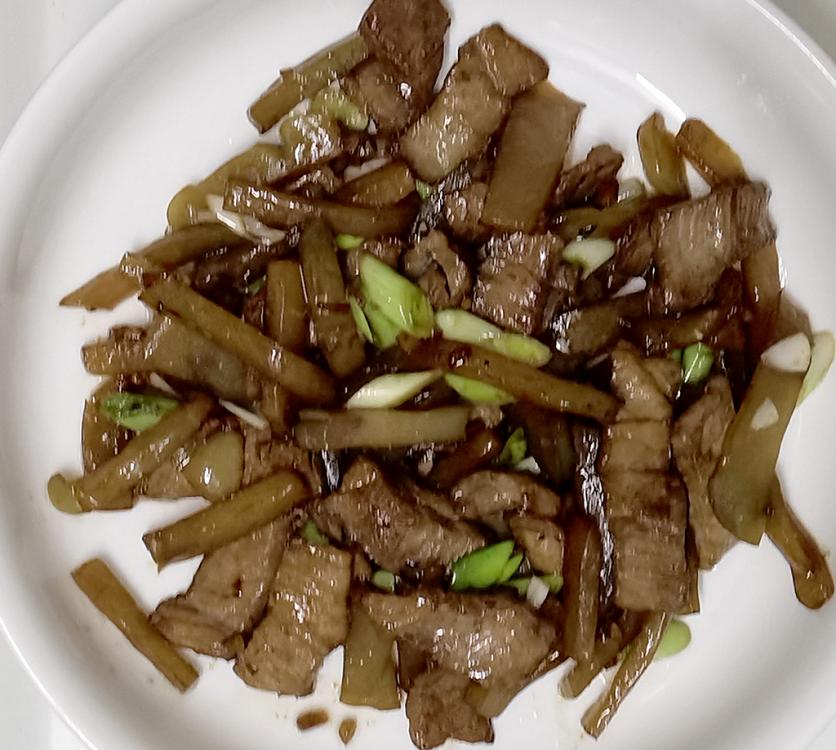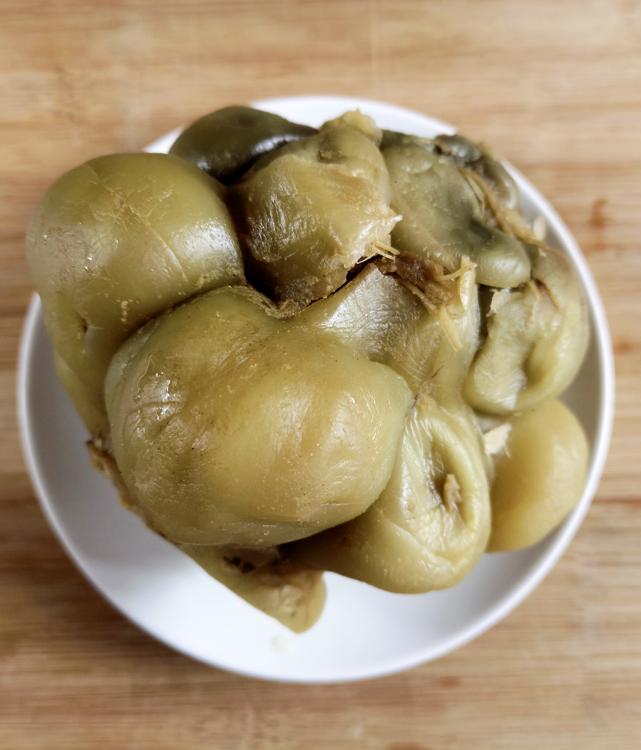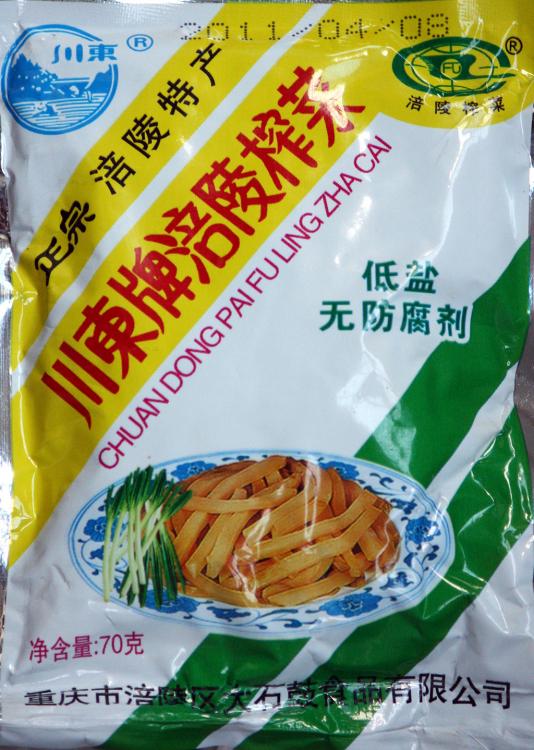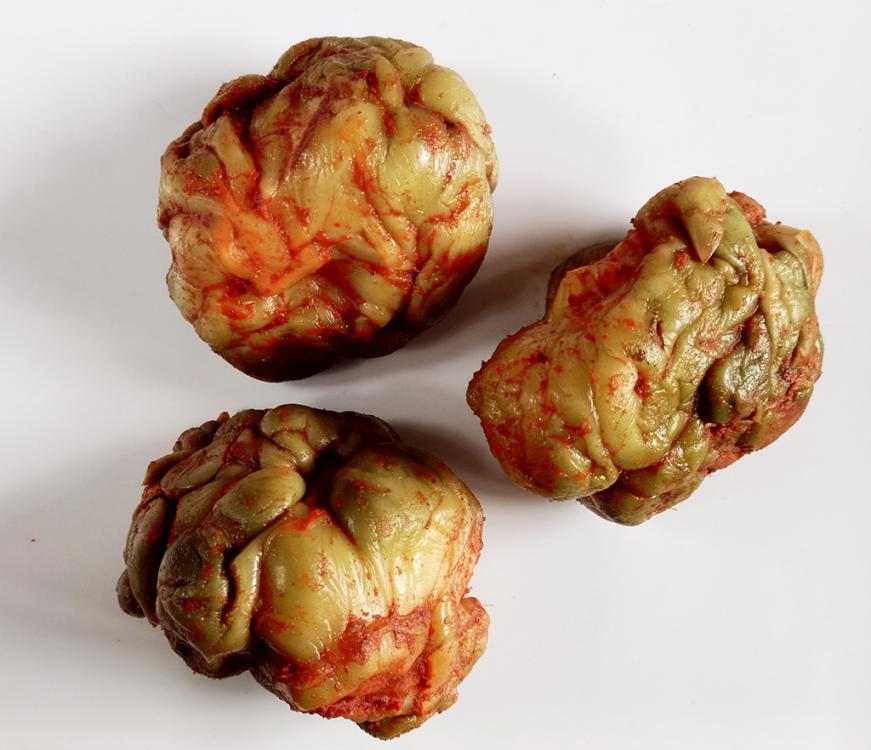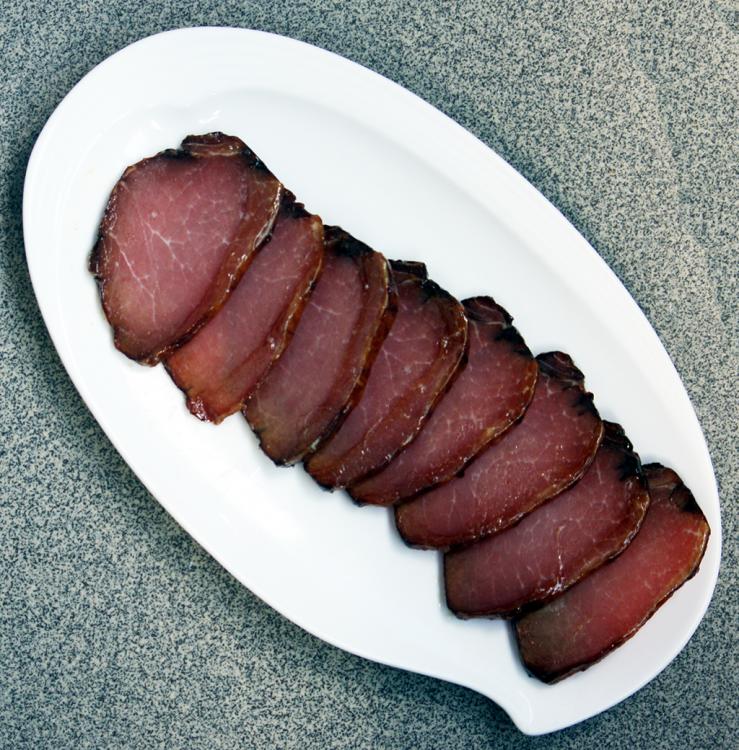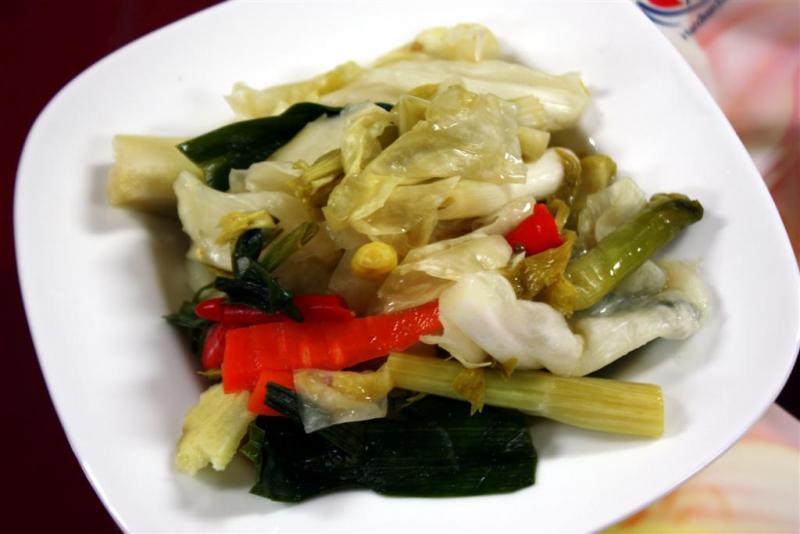-
Posts
16,696 -
Joined
-
Last visited
Content Type
Profiles
Forums
Store
Help Articles
Everything posted by liuzhou
-
11. 酸豆角 (suān dòu jué, literally pickled bean horn); Pickled Yard-Long-Beans (Vigna unguiculata subsp. sesquipedalis) 豆角 (dòu jué) is a generic term covering all sorts of green beans, but it is the name used in the market where I bought these. Actually, they are 长豇豆 (cháng jiāng dòu); meaning “long cow peas”, a type of “yard-long-bean”. In fact, they are not a yard long, instead being around half that, at 18 inches/46cm which is the meaning of the Latin sesquipedalis or “one-and-a-half-foot-long”. These are a very popular pickle, often home made, but also available in markets and supermarkets. They are cured in brine with spices, often chili and sold in bunches like this. They are chopped up and served over rice, porridge etc or added to stir fries. They are also just served as a side dish with other dishes. They are also sold factory made in supermarkets and mom and pop stores as a snack. The pickled bean pods are again chopped, then mixed with chili, ginger, garlic, chili oil, etc. As well, as being a snack, people often mix them with noodle or rice dishes. Fuchsia Dunlop's The Food of Sichuan (eG-friendly Amazon.com link) gives a recipe for curing the beans and then cooking them with minced/ground pork. The same unpickled beans are also preserved by drying, in which case they are rehydrated and sliced then added to soups, hotpots and stir fries.
-
-
Nope. never heard of it, but what I know about Mexican food is almost zero. Too much c@rn, for a start! Japanese? Maybe, but I'm doubtful.
-
I wasn't planning to get to this yet, but since it has come up (my fault entirely) in this topic, I'll deal with it now. 10. 黑蒜 (hēi suàn) - Black Garlic I guess I first have to address whether or not 'black garlic' is Chinese in origin. The answer is "I don't know." But, neither does anyone else. There are dozens of websites offering to tell you the history of this product; few do. Others make ridiculous claims and yet others just repeat what the ridiculous ones said. Wikipedia, not usually shy of inaccuracies and downright nonsense, just ignores the history completely, only showing this. The two most absurd claims concern Korea (not that these rule out Korea as the source, just not in these accounts). In 2004, a Korean entrepreneur patented a machine to produce black garlic on an industrial scale. By the time he moved to the USA in 2008, he seems to have become over-excited and started claiming that he invented the stuff! His company is now America’s top supplier. Great marketing, useless history. I know this for a fact! I first ate black garlic in Changsha, China 7 years before he invented it! Then we have the British garlic farmer who claimed even later to have discovered a 4,000-year-old Korean recipe for black garlic and tried it out. Somehow, he imagined that this meant he had invented it. Sorry mate, but if you discover a recipe and make it, you have invented precisely nothing! Interestingly, he seems to have since lost that ancient recipe and so has never actually produced it in evidence. Very convenient. More marketing BS. Another site mentions that it went from Korea to Taiwan, before being introduced to the rest of the world, including mainland China in 2010. Yeah! Right! And tea was introduced to Britain by Alaskan monks in 1953, after being invented by an Australian sheep farmer in 1412 . There is credible evidence that the 4th century BC Chinese classic Tao Te Ching (道德经 - dào dé jīng), the ‘bible’ of Daoism, mentions black garlic, although that tome is notoriously difficult to translate. Even Chinese scholars find it very difficult to interpret accurately. There are also plausible mentions in ancient Korean and Japanese documents. What I do know is that black garlic is definitely sold in China, so I think it can be mentioned here. You have to search it out – it certainly isn’t mainstream, but not difficult to find. The current supply I have is from Shandong Province on China’s east coast, also home to Confucius and Mao Zedong’s wife, Jiang Qing (who committed suicide in prison after Mao’s death) – maybe one of them invented it! The other main thing to say about black garlic is that, again despite claims on websites which should know better, it isn’t fermented in any accepted definition of fermentation. It is cooked. It is preserved, however. Whole bulbs of regular garlic are held at a temperature of 60℃ to 90℃ in a humidity of 80% to 90% for weeks or even months. You can do this at home using a slow cooker or rice cooker. However, only if you have very tolerant house companions and neighbours. It smells extremely garlicky, especially in the first couple of weeks. Most online recipes suggest processing it in a garage or outhouse, should you have one. Recipe here. Probably better to buy commercially processed garlic - once done, there is virtually no smell. The garlic undergoes a Maillard reaction and eventually turns soft and sticky. It loses all the sharp, slightly bitter taste of raw, unprocessed garlic and instead becomes sweet and reminds many people, including me, of balsamic vinegar, but without the acidity. I get two types. The first, from regular heads, is in the first picture above, but my preference is for this single-headed garlic from SIchuan, 黑独蒜 (hēi dú suàn). It can be eaten as is or added to salads, stir fries, etc. I like to crush it into mashed potatoes or just serve with rice. Black garlic mayo. Black garlic vinaigrette. The list goes on. Black garlic cookie, anyone?
-
Good question, to which I don't have the answer. The entire history of black garlic is mired in dissent, lies and male bovine excrement. I'll go into more detail in the other topic. P.S. Black garlic isn't fermented.
-
My favourite garlic snack is black garlic. You can make that if you have several weeks and don't mind your house stinking of garlic for the duration. It can be made in a rice cooker. I'll say more about it in the pickles thread soon.
-
9. 白萝卜 (bái luó bo) -Preserved Daikon Radish One of the most popular vegetables to be preserved in China has to be what is known here as 白萝卜 (bái luó bo). This is what you may know as daikon or mooli. Daikon is the Japanese name (ダイコン) ; mooli is Hiindu ( - कम -mūlī). Whatever, it is Raphanus sativus var. longipinnatus - a type of giant radish. These are used fresh in many ways - often in soups or hotpots, but also in stir fried dishes. But they are also preserved by several methods. Drying is a favourite. The vegetable is cut into thin strips and sun dried on any piece of available flat surface. I've seen vegetables drying on remote railway station platforms, sports grounds and even car roofs. Home Dried Daikon Radish Cabbage Car It is also dried more industrially to be sold in supermarkets, etc. Dried Daikon Radish from Supermarket It is also pickled in vinegar. This one below uses red-skinned radishes which gives the colour. What is less well known perhaps, is that the leaves of the plant are also edible (and delicious). These are also used fresh in stir fries, but often pickled, often industrially and sold as 萝卜头 (luó bo tóu, literally 'radish head'). You can grow dakion radish leaves fairly easily. Here is my first effort, some years ago. My technique has somewhat improved since!
-
I mentioned 酸菜鱼 (suān cài yú) in the Chinese Pickles and Preserves topic here. This soup dish of fish and pickled mustard leaf is a Sichuan classic. Today, I came across a variant. This was 酸菜鱼分 (suān cài yú fěn) i.e the same fish and pickles served with rice noodles. Thinly sliced grass carp; sour and spicy, pickled vegetation; smooth rice noodles - perfect lunch.
-
Me too. I haven't tried this one yet. I seem to have acquired a more than adequately large collection of honeys in the last few weeks. This one is, as others have suggested, 'creamed'. Here is my translation of the the more interesting information on the rear label of the jar.
-
Chinese Tilia Honey Here is the entire relevant Wikipedia entry This batch is indeed from said mountain.
-
8. 大头菜 / 淡口采 - Salt Cured Turnip Here's another Sichuan beauty for you. Sadly, you are unlikely to run into it outside China. It comes in China with various names. Fuchsia Dunlop calls it 大头菜 (dà tóu cài, literally 'big head vegetable') , a name I've seen elsewhere, whereas my local supplier calls it 淡口菜 (dàn kǒu cài, literally 'mild mouth vegetable). Whatever, it is a type of turnip Brassica juncia var. napitormis, native to China. This is another salt-cured item and arrives shrink wrapped in a pair, curled into a ball. Teasing the ball apart reveals the two plants, looking like some monsters from the deep. It is, as the local name suggests, relatively mildly cured compared to the zha cai in the previous numbered post, but is used in the same ways.
-
I just did a quick check on Taobao, China's largest on-line shopping portal. I searched for "Chinese pickled vegetables". It returned 40,339 pages with 40 items per page = 1,613, 560 items! Of course, that doesn't mean that number of different items. But I think it does show that this topic could run forever! And that's just the vegetables.
-
Having bought a head of Zha Cai to decorate my post in the link, it seemed opportune to cook some of it. To tell you the truth, I've been a bit off my grub since I had my first Covid vaccine a few days ago. I don't know if that is just coincidence or not. I don't feel in the least unwell; just not hungry. It could be the weather. Anyway, I just made a simple dish of pork and zhacai with garlic and scallions. The salty spicy flavours of the zha cai seemed to perk up my taste buds. I also added a little soy sauce and even less oyster sauce. The sweetness of the oyster sauce counter-balanced the salty pickle nicely. Served with rice. Not the prettiest dish ever; but tasty. Followed up with three jam doughnuts. As all good Sichuan people do!
-
7. 榨菜 (zhà cài) - hot pickled mustard tuber Sichuan is known for its pickle, but one in particular stands out. Again it's a type of mustard, this time Brassica juncea subsp. tsatsai. Only the bulbous tuber is used in what is termed 榨菜 (zhà cài), literally 'pressed vegetable'. Zha Cai The tubers are salted then pressed with a heavy weight placed on top. After some time (it varies) they are dried, then put into earthern jars with ground chillies and/or chili paste, Sichuan peppercorns and other spices and left to ferment. When deemed suffiently fermented, the chilli paste etc is washed off and they are ready to be eaten. Washed zha cai The fermented tubers can be chopped finely and used in several ways. In Sichuan, chopped zha cai is often added to congee for breakfast. Alternatively it can be sliced and added to stir-fries. Zha cai from Fuling district (涪陵区 - fú líng qū) in Chongqing (formerly part of Sichuan), is said by many to be the best. It is also where the pickle is believed to have been invented. Wujiang (乌江 - wū jiāng) is the largest brand and is located in Fuling. I'm told it is often sold canned in Chinese markets in the USA and Britain, unhelpfully labelled in English as 'Chinese preserved vegetable'. That could cover literally hudreds of things. Here I can buy it by the bulb, as above, as well as cut into batons or finely chopped. It is also sold in jars or bags.
-

Help please! Looking for a Chinese pickle jar in northern New Jersey
liuzhou replied to a topic in Kitchen Consumer
-
Yes. And fish. I'll get to that eventually.
-
Cured but not smoked.
-
Most bacon in the world is more like that than like American bacon.
-
Talking of the soy pickled garlic remind me of this. Another type of preserved food. Soy sauce cured bacon.
-
Same here. Pickles may not feature on the menu, but are served as described. They also appear in many dishes, but may not be listed on the menu. Many Sichuan dishes, for example, contain pickled chillies.
-

Help please! Looking for a Chinese pickle jar in northern New Jersey
liuzhou replied to a topic in Kitchen Consumer
I'm in the wrong business! They are about $3 here! -

Help please! Looking for a Chinese pickle jar in northern New Jersey
liuzhou replied to a topic in Kitchen Consumer
I'd be interested to know how much one of these costs in the USA, if anyone can enlighten me. Thanks. -
Well, they certainly are here in China. Most larger retaurants catering for weddings, banquets etc make their own paocai. What happens elsewhere, I don't know. This plate of pickles was served at just such a restaurant here 10 years ago, as documented in this post. One of my regular haunts only has five tables and also makes all its own pickles. My neighbours make their own pickles.


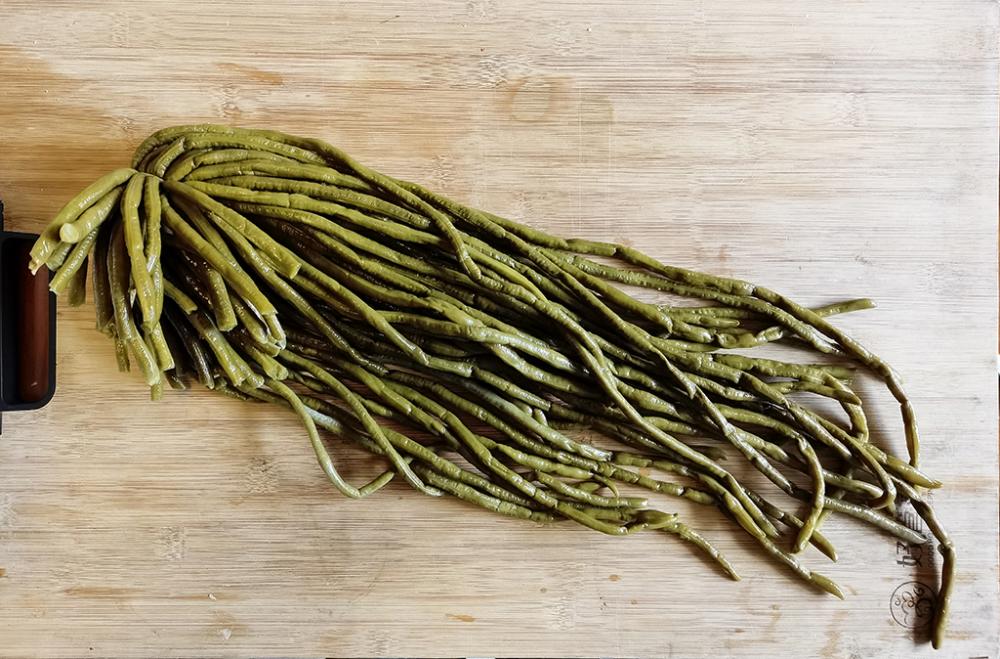
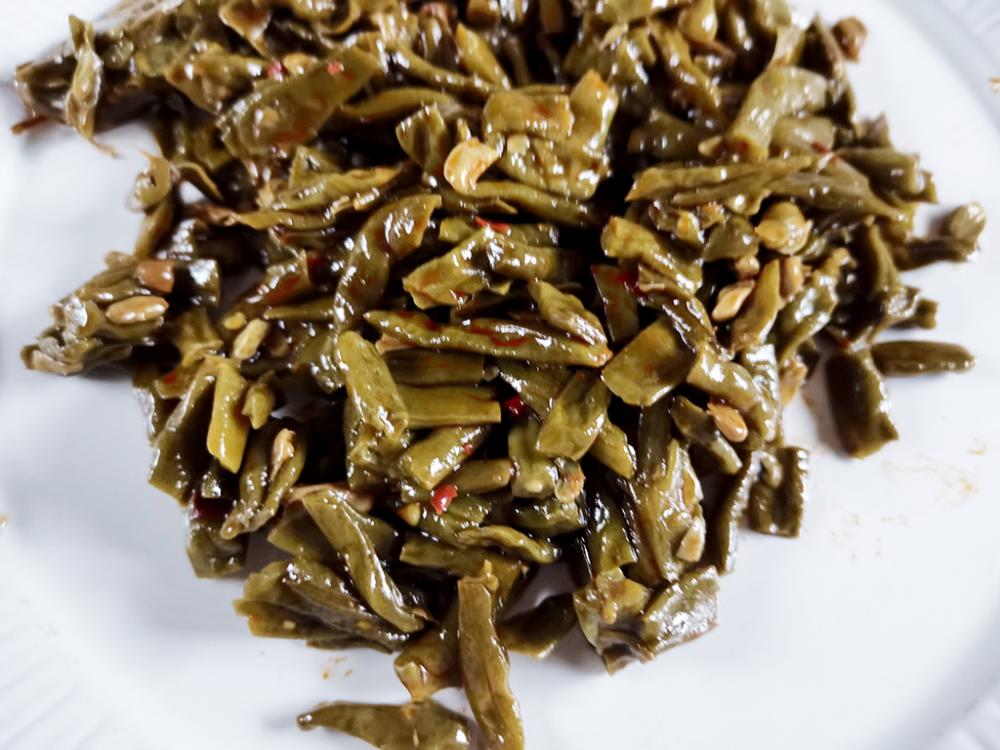
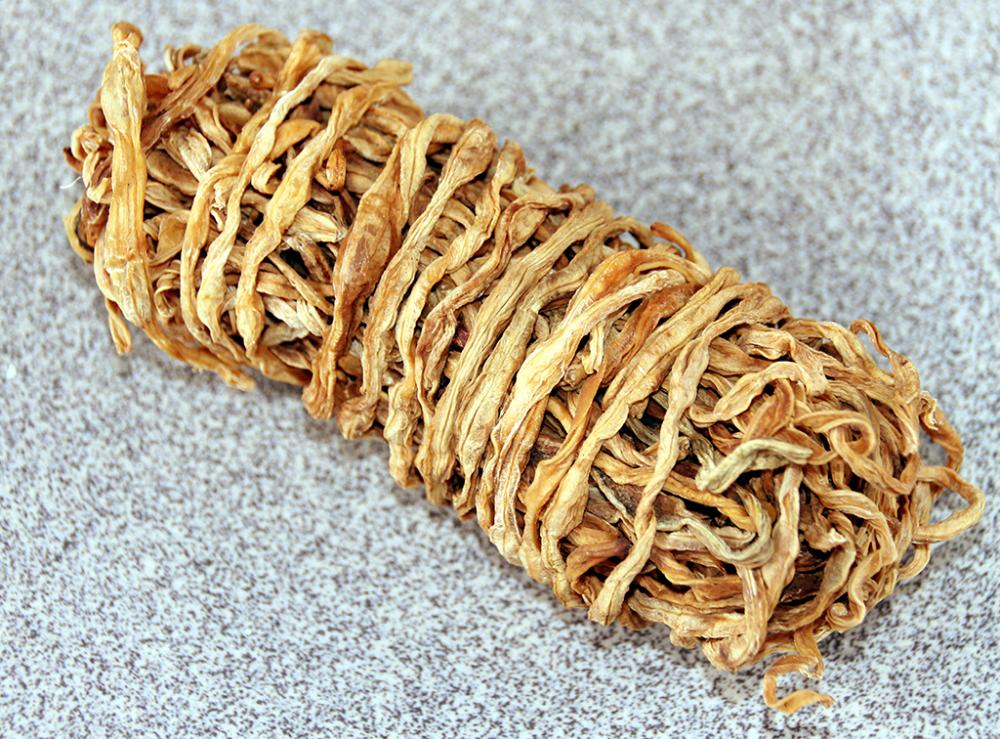




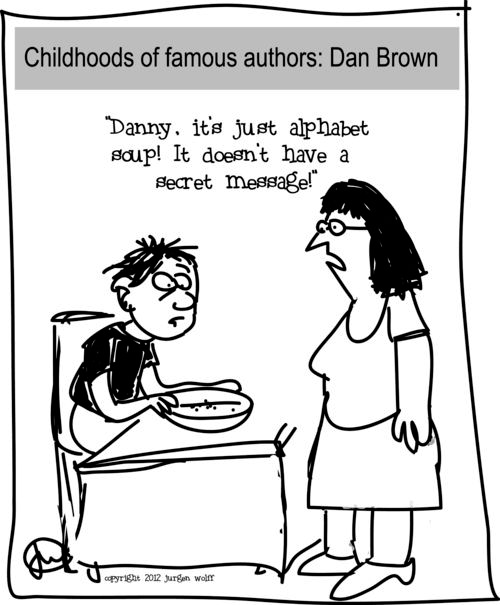
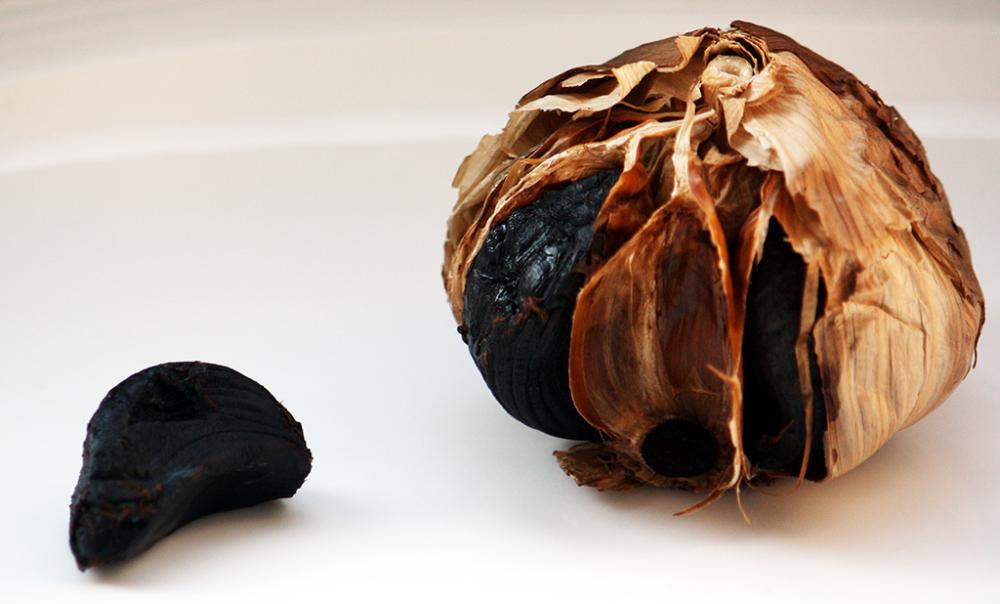
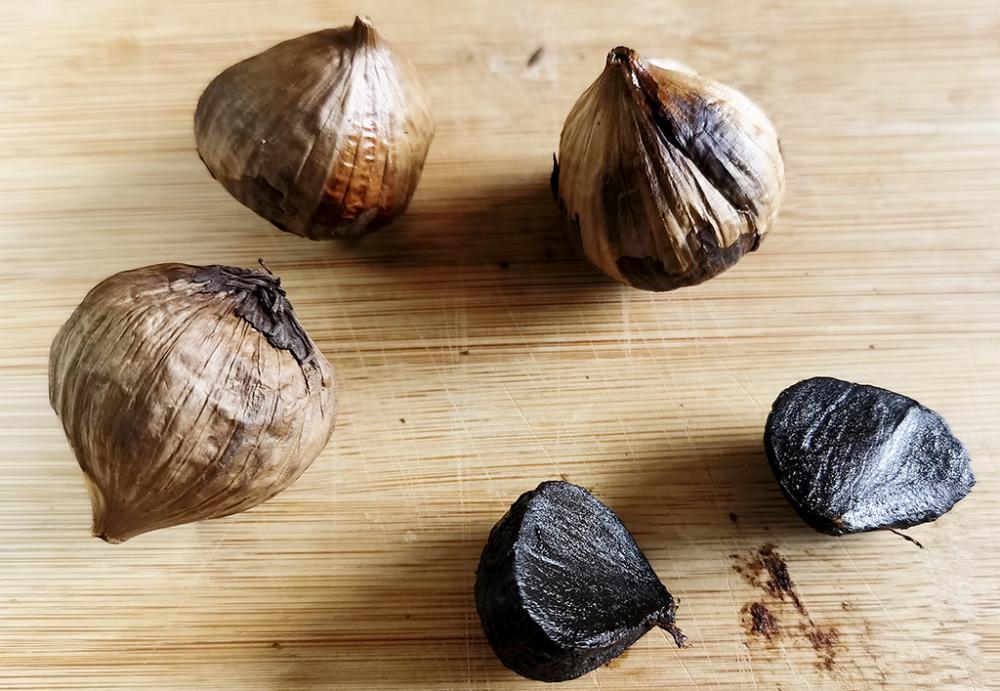


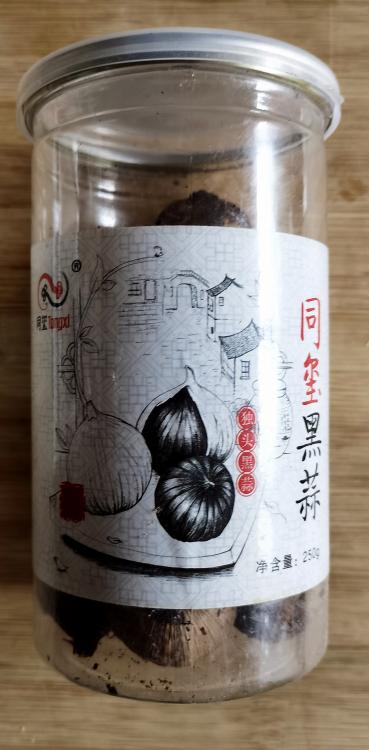
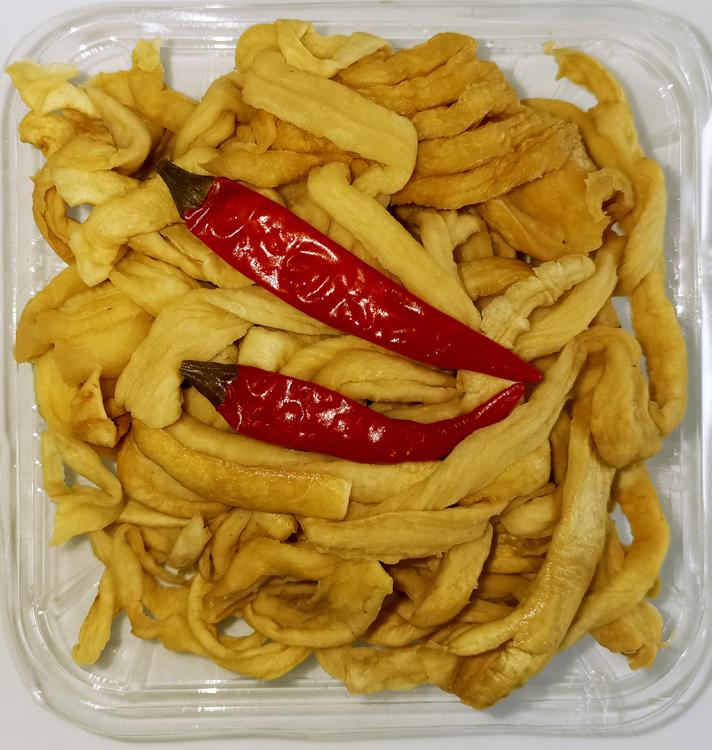
.thumb.jpg.e200a35b6bf775436cf0cfbfb3952fcb.jpg)


